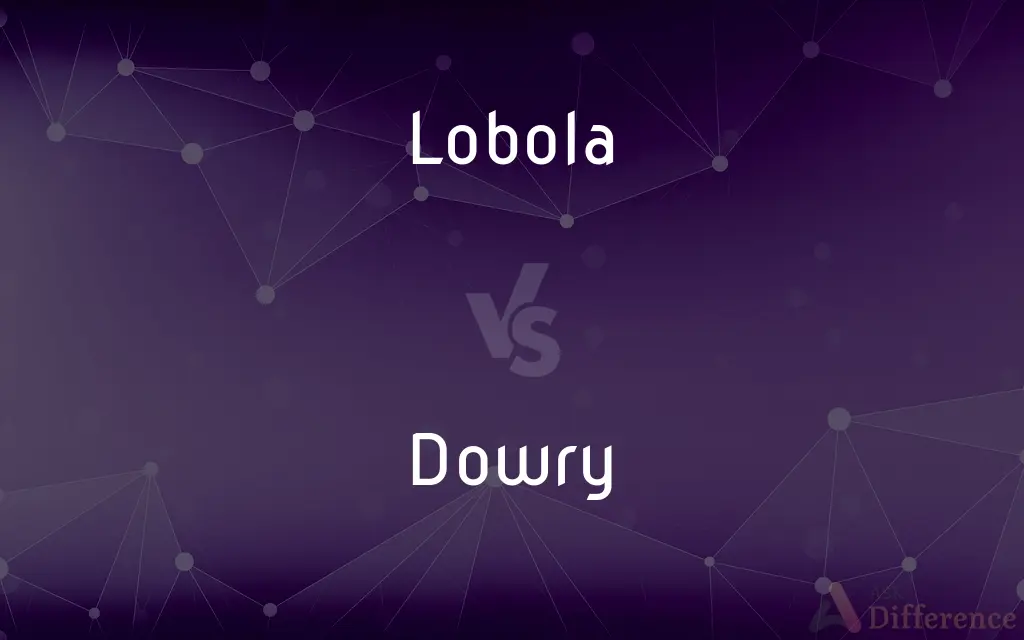Lobola vs. Dowry — What's the Difference?
By Maham Liaqat & Urooj Arif — Updated on May 17, 2024
Lobola is a bride price paid by the groom's family to the bride's family in some African cultures, while a dowry is wealth transferred from the bride's family to the groom or groom's family in various cultures worldwide.

Difference Between Lobola and Dowry
Table of Contents
ADVERTISEMENT
Key Differences
Lobola is a traditional practice in many African cultures where the groom's family pays a bride price to the bride's family. This payment, often in livestock or money, signifies the groom's commitment and appreciation. On the other hand, a dowry is a cultural practice in various parts of the world, such as South Asia and Europe, where the bride's family provides wealth or property to the groom or his family as part of the marriage agreement.
Lobola is viewed as a token of appreciation and a means to solidify family bonds and alliances. It emphasizes the groom's ability to provide for the bride and respect her family. In contrast, a dowry often serves as financial security for the bride and can be used by the groom's family to support the newlyweds or the family itself.
In Lobola, the transaction is typically more symbolic, focusing on cultural and familial significance. The process involves negotiation and agreement between families, reflecting the value placed on the bride and her family's role. Conversely, dowry practices can sometimes lead to economic strain on the bride's family and have been associated with negative social issues, including dowry-related violence.
The amount and nature of Lobola can vary significantly depending on the cultural norms and the specific agreements made by the families involved. Whereas, the dowry amount and its components (like cash, jewelry, or property) are often influenced by societal expectations and economic status.
Comparison Chart
Payment From
Groom's family to bride's family
Bride's family to groom or groom's family
ADVERTISEMENT
Common Regions
Various African cultures
South Asia, Middle East, parts of Europe
Purpose
Symbolic appreciation and family bond
Financial security and marriage facilitation
Nature of Payment
Livestock, money, or other valuables
Cash, jewelry, property, or other wealth
Social Implications
Positive cultural significance
Can lead to economic strain and social issues
Compare with Definitions
Lobola
A form of dowry where the groom's family compensates the bride's family.
Negotiations for the lobola took several weeks.
Dowry
Financial gifts given during marriage arrangements.
The dowry was discussed in detail before the wedding.
Lobola
A traditional bride price paid by the groom's family in African cultures.
The groom's family gathered the cattle to pay the lobola for the bride.
Dowry
Wealth transferred from the bride's family to the groom or his family.
The dowry included gold jewelry and a large sum of money.
Lobola
A symbolic gesture signifying the groom's commitment.
The lobola included several cows and a sum of money.
Dowry
Property or money brought by a bride to her husband on their marriage.
The dowry helped the couple start their new life together.
Lobola
A cultural practice to strengthen family bonds.
Lobola ceremonies are grand and festive events.
Dowry
A dowry is a payment, such as property or money, paid by the bride's family to the groom or his family at the time of marriage. Dowry contrasts with the related concepts of bride price and dower.
Lobola
An integral part of marriage negotiations in some African traditions.
Without lobola, the marriage would not be recognized by the community.
Dowry
Money or property brought by a bride to her husband at marriage.
Lobola
The bride price paid by a prospective husband among certain peoples in southern Africa.
Dowry
A sum of money required of a postulant at a convent.
Lobola
(South Africa) The bride price among certain Bantu peoples of South Africa.
Dowry
A natural endowment or gift; a talent.
Dowry
(Archaic) See dower.
Dowry
Payment, such as property or money, paid by the bride's family to the groom or his family at the time of marriage.
Dowry
(less common) Payment by the groom or his family to the bride's family: bride price.
Dowry
(obsolete) Dower.
Dowry
A natural gift or talent.
Dowry
To bestow a dowry upon.
Dowry
A gift; endowment.
Dowry
The money, goods, or estate, which a woman brings to her husband in marriage; a bride's portion on her marriage. See Note under Dower.
Dowry
A gift or presents for the bride, on espousal. See Dower.
Ask me never so much dowry and gift, and I will give . . .; but give me the damsel to wife.
Dowry
Money or property brought by a woman to her husband at marriage
Dowry
A practice common in South Asian and other cultures to support the bride.
Her family saved for years to provide a substantial dowry.
Dowry
A cultural tradition involving the transfer of assets from bride's to groom's family.
Dowry negotiations were a crucial part of the marriage discussions.
Common Curiosities
In which regions is a dowry practiced?
Dowry practices are common in South Asia, the Middle East, and parts of Europe.
How does Lobola differ from a dowry?
Lobola involves payment from the groom's family to the bride's family, while a dowry is given by the bride's family to the groom or his family.
In which regions is Lobola practiced?
Lobola is practiced in many African cultures.
What is the purpose of Lobola?
Lobola serves as a token of appreciation and to strengthen family bonds.
What is the purpose of a dowry?
A dowry often provides financial security for the bride and supports the marriage arrangement.
What is a dowry?
A dowry is wealth transferred from the bride's family to the groom or his family, common in various cultures worldwide.
How is the amount of Lobola determined?
The amount is usually negotiated between the families and can vary widely.
Is Lobola legally required?
In some cultures, Lobola is an essential part of the marriage process.
How is the amount of a dowry determined?
The amount is influenced by societal expectations and the economic status of the bride's family.
What is Lobola?
Lobola is a bride price paid by the groom's family to the bride's family in African cultures.
Are there social implications of Lobola?
Lobola is generally seen positively, reinforcing cultural and familial ties.
What typically constitutes a dowry?
A dowry can include cash, jewelry, property, or other forms of wealth.
What typically constitutes Lobola?
Lobola can include livestock, money, or other valuables.
Are there social implications of a dowry?
Dowry practices can sometimes lead to economic strain and social issues, including dowry-related violence.
Is a dowry legally required?
While not always legally required, dowry practices are deeply rooted in cultural traditions in some regions.
Share Your Discovery

Previous Comparison
Bitumen vs. Bituminous
Next Comparison
Doodle vs. PoodleAuthor Spotlight
Written by
Maham LiaqatCo-written by
Urooj ArifUrooj is a skilled content writer at Ask Difference, known for her exceptional ability to simplify complex topics into engaging and informative content. With a passion for research and a flair for clear, concise writing, she consistently delivers articles that resonate with our diverse audience.













































